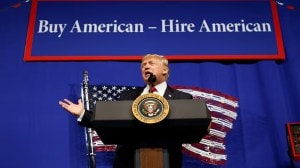India’s proposed separate law for digital competition is a softer version of the European Union’s Digital Markets Act (DMA), said a member of the committee that drafted the Digital Competition Bill.
“Our draft has provided a whole lot of exemptions. It is not as harsh as is being currently perceived,” said the member, on condition of anonymity.
The comments come as many experts contend that the proposed law with provisions of ex-ante regulation could stifle innovation and hit the start-up sector.
The panel member India’s draft law, as opposed to the EU’s DMA, talks about specific areas under which digital companies (Big Tech) can exempt themselves from following the law. These include impact on economic viability, prevention of fraud, cybersecurity threat, prevention of unlawful infringement of IP rights, and other such factors.
“Growth for a business comes from certain attributes. It could be IPR, business strategies, tech, etc. A company would not want to disclose such crucial information to CCI as it might lead to different sorts of threats for the business,” he said.
Similarly, if a company is able to prove that by complying with the law, it could incur economic losses, it’s not bound to follow the law.
“People buy goods and services from a particular firm because of its unique characteristics. If through the actions of CCI, their unique selling point cannot be maintained, they can just bypass these rules,” the member said.
Even though the draft bill said that CCI will devise case-specific exemptions; the broad areas under which compliance from the ex-ante obligations may be exempted will be statutorily encoded.
“Noting that the obligations for SSDEs (systemically significant digital enterprises) would differ from one core digital service to the other, the committee opined exemptions from such obligations would also consequently differ, and therefore recommended that exemptions should not be hardwired in the draft DCB,” the draft bill said.
In February 2023, a 10-member committee was set up to prepare ex-ante legislation to counter the rising dominance of Big Tech firms in the digital markets.
Unlike the present Competition Act which is ex-post, the proposed legislation requires large tech firms to notify CCI if they qualify as SSDE.Broadly, the draft bill restricts tech companies to engage in anti-competitive activities such as restricting third-party apps, self-preferecing, misusing business and end-user data, and bundling products and services.
Large players like Apple, Google, Amazon, Meta, Uber, and Flipkart have opposed the draft bill citing lack of global examples where the ex-ante regulations have worked.









